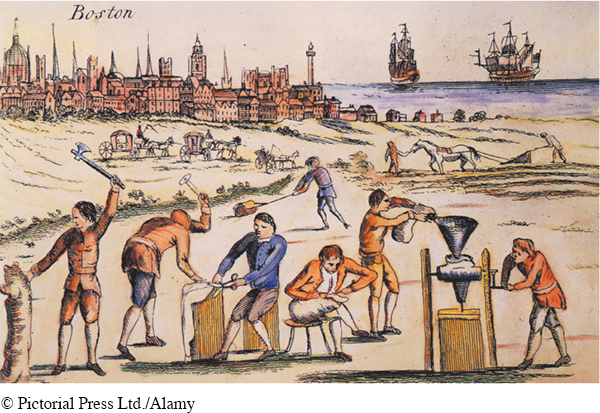Imperial Policies Focus on Profits
European sovereigns worked to ensure that this international trade and their colonial possessions benefited their own European treasuries. In the late seventeenth century, both Louis XIV and his English rivals embraced a system known as mercantilism, which centered on the maintenance of a favorable balance of trade, with more gold and silver flowing into the home country than flowed out. In France, finance minister Jean-Baptiste Colbert honed the system. Beginning in the 1660s, he taxed foreign imports while removing all barriers to trade within French territories. Colonies provided valuable raw materials that could be used to produce manufactured items for sale to foreign nations and to colonists.
While France’s mercantile system was limited by the size of its empire, England benefited more fully from such policies. The English crown had access to a far wider array of natural resources from which to manufacture goods and a larger market for these products. Beginning in 1660, Parliament passed a series of Navigation Acts that required merchants to conduct trade with the colonies only in English-owned ships. In addition, certain items imported from foreign ports had to be carried in English ships or in ships with predominantly English crews. Finally, a list of “enumerated articles”—including tobacco, cotton, sugar, and indigo—had to be shipped from the colonies to England before being reexported to foreign ports. Thus the crown benefited directly or indirectly from nearly all commerce conducted by its colonies. But colonies, too, often benefited, as when Parliament helped subsidize the development of indigo in South Carolina.
In 1663 Parliament expanded its imperial reach through additional Navigation Acts, which required that goods sent from Europe to English colonies also pass through British ports. And a decade later, ship captains had to pay a duty or post bond before carrying enumerated articles between colonial ports. These acts ensured not only greater British control over shipping but also additional revenue for the crown as captains paid duties in West Indies, mainland North American, and British ports. Beginning in 1673, England sent customs officials to the colonies to enforce the various parliamentary acts. By 1680, London, Bristol, and Liverpool all thrived as barrels of sugar and tobacco and stacks of deer and beaver skins were unloaded and bolts of dyed cloth and cases of metal tools and guns were put on board for the return voyage. As mechanization and manufacturing expanded in England, Parliament sought to keep the profits at home by quashing nascent industries in the colonies. It thus prohibited the sale of products such as American-made textiles (1699), hats (1732), and iron goods (1750). In addition, Parliament worked to restrict trade among the North American colonies, especially between those on the mainland and in the West Indies.

Despite the increasing regulation, American colonists could own British ships and transport goods produced in the colonies. Indeed, by the mid-eighteenth century, North American merchants oversaw 75 percent of the trade in manufactures sent from Bristol and London to the colonies and 95 percent of the trade with the West Indies. Ironically, then, a system established to benefit Great Britain ended up creating a mercantile elite in British North America. Most of those merchants traded in goods, but some traded in human cargo.
Exploring American HistoriesPrinted Page 82
Exploring American Histories Value EditionPrinted Page 62
Chapter Timeline